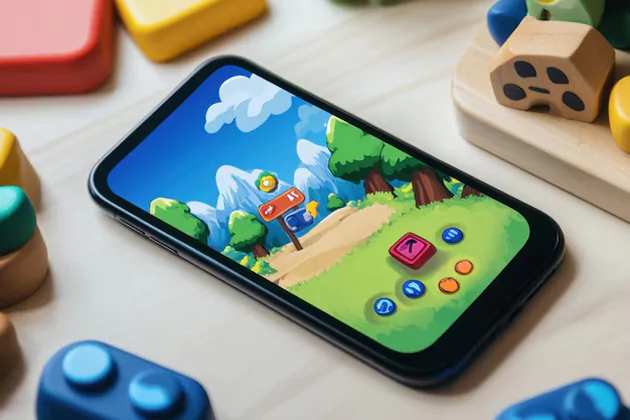Creating an Android game app can be an exciting venture. This guide will walk you through the steps to build your app, similar to popular titles like Crazy Time. Whether you are an aspiring developer, an indie creator, or simply curious about mobile app development, this guide will help you discover how to make a simple game app for Android and turn your ideas into reality. Here are step-by-step procedures. For those looking to explore game mechanics or monetization strategies, examining sites not covered by GamStop can offer insight into alternative models and unrestricted platforms used by international audiences.
Step 1: Conceptualizing the Game Idea
Start with a unique concept to create a successful Android app. A distinctive idea helps your product stand out in the competitive market. Conducting a thorough market analysis is crucial when exploring how to make a game app for Android. Identify current trends in Android game development and look for gaps or opportunities that yours can address. This analysis helps you design a product that fills a niche and appeals to players.
Knowing who will play your app guides your design and development choices. Focus on features and mechanics that will effectively engage your audience.
Develop a Game Design Document (GDD) to outline the core elements. The GDD should cover play mechanics, storyline, characters, and the overall vision. A well-crafted GDD supports your mobile game design process and keeps your development on track.
Visit the Crazy Time app official site for further inspiration on successful concepts. It offers valuable insights into how innovative ideas can be effectively executed.
Step 2: Planning and Development
Development Tools: Start by selecting the right tools for your project. Popular options include Unity, Unreal Engine, and Android Studio. These platforms support various aspects of Android game development and can streamline your workflow.
Wireframes & Prototypes: Create wireframes and prototypes before diving into full-scale development. These early-stage models help visualize the layout, user interface, and overall flow.
Art Style: Choose an art style that complements the theme and appeals to your target audience. Consistency in mobile app design is vital for maintaining visual coherence.
Sound Design: Incorporate sound effects, background music, and voiceovers to enrich the gaming experience. Effective sound design enhances immersion and can significantly impact player engagement.
Focusing on these aspects will lay a strong foundation for your app development process. To bring your vision to life, use the right Android development tools and consider the best game engine for Android.
Step 3: Developing the Game
Setup & Tools: Set up Android Studio and install the necessary SDKs. These tools are essential. Follow a step-by-step guide to configure your development environment and get everything in place for coding.
Programming Aspects: Focus on coding the logic and implementing physics to create realistic funplay. Manage the states to ensure smooth transitions between different stages or levels. This involves writing code for player interactions, mechanics, and overall functionality.
Optimization: Optimize your product to ensure it runs smoothly across Android devices. This includes reducing the load time, minimizing lag, and ensuring compatibility with different screen sizes and hardware specifications.
Testing: Thoroughly test your application to identify and fix bugs or glitches. Use emulators to simulate different device environments and gather feedback from beta testers. This helps to enhance its overall quality before the final release.
Focusing on effective Android game coding and thorough mobile game programming can help you develop a high-quality application that performs well on various devices.
Step 4: Integrating Monetization and Social Features
Monetization Options: Consider various monetization strategies to earn revenue from your product. Standard options include in-app purchases, ads, and offering a premium version. These methods can generate income while providing players with extra content or features.
Social Features: Adding features like leaderboards and achievements can significantly boost user engagement. These elements encourage players to compete and connect with others.
Analytics: Use analytics tools to monitor user behavior and track performance. You can decide about updates and improvements by analyzing how players interact with your mobile software. This ongoing analysis helps refine your Android game launch and supports a solid game app marketing strategy.
Integrating these features helps you better understand your audience and maximizes your product’s potential.
Step 5: Preparing for Launch
Thorough Testing: Comprehensive testing is crucial before your application is launched. Effective Android game testing helps ensure it runs smoothly across different devices.
Promotional Materials: Develop a captivating trailer, high-resolution screenshots, and a detailed press kit. These elements generate buzz and attract potential players.
Store Listing: Write an engaging description highlighting your product’s unique features. Setting up an attractive pricing strategy will help draw in your target audience. A robust game app tutorial will guide users through what to expect when playing it.
Step 6: Post-Launch Maintenance and Updates
User Engagement: After launching, monitoring user reviews and feedback is essential. For example, Crazy Time effectively uses feedback to enhance its gaming experience. This proactive approach to managing user experience ensures better player satisfaction and retention.
Updates & Scaling: Plan and release updates to address bugs, introduce new features, and improve player’s experience. Ensure your application can scale to accommodate increasing traffic and user demand. Utilizing tools for mobile game UX design and game app optimization can help streamline this process.
Maintaining and keeping updates contributes to its long-term success.
Conclusion
Creating an app for Android involves several steps. Aspiring developers should remember that even the most successful applications often start with a simple concept. With perseverance and creativity, you can turn your vision into reality. So, take the first step in learning how to make a game app for Android and embark on the journey. Your innovative idea could be the next big hit in the app store!










